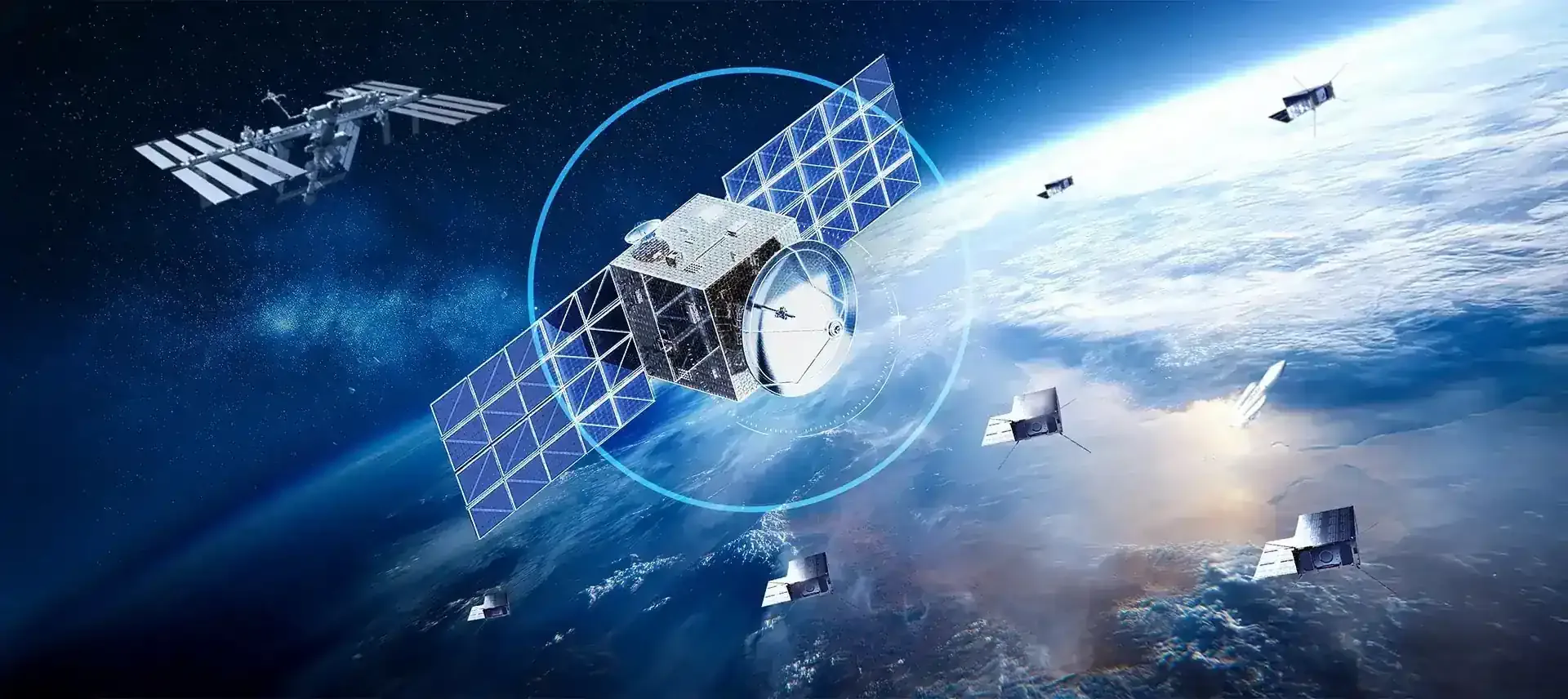Space
Accelerate space companies' ability to design a system right the first time with the required quality, reliability and safety at lower cost.
What Are the Trends Changing the Space Landscape?
Welcome to the exciting and continuously evolving space industry — a bustling arena of activity where modern rocketry, advanced satellites, high-throughput satellite communications, human spaceflight, and deep space exploration are just the beginning. As the space industry barriers to entry continue to be reduced, the potential impacts on our daily lives and future technologies are immense. At Dassault Systèmes, we are excited to be part of this vibrant transformation, enabling new mission areas and supporting the profitability and sustainability of space missions.
- New Space
- Space Exploration
- Mega-constellations
- Geospatial Data Analytics
- Simulation for space
Podcast: Are We Ready for a New Space Economy?
Tune in to learn how In-space Servicing, Assembly and Manufacturing (ISAM) technologies power a more sustainable space environment and economy.
New Space
How do you keep pace with the New Space economy?
The space industry is undergoing a seismic shift. Once dominated by government agencies, today’s space frontier—New Space—is fueled by private enterprises, startups, and agile disruptors. This dynamic sector is redefining what’s possible in rocketry, satellite technology, exploration, and even space tourism.
To lead in this fast-evolving market, companies must adopt a new playbook: faster cycles, smarter & informed risk-taking, and digital-first collaboration. With investors demanding rapid innovation and mission reliability, the cost of failure has never been higher.
Dassault Systèmes enables New Space players to develop, simulate, and validate entire systems virtually—getting it right the first time. From smallsat constellations to launch vehicles and more, a unified digital platform helps manage complexity, accelerate certification, and scale breakthroughs.
In this new space race, success belongs to those who can bring bleeding-edge innovation to the industry with speed and accuracy.
Defy Limits With Space Technology
Pioneer in-space servicing, assembly and manufacturing innovations to reimagine satellite lifecycles for a sustainable space environment and economy.
Space Exploration
How do you turn science fiction into reality?
Hundreds of private companies and startups are not only driving down the cost to access space, but also fueling public interest in developing destinations in orbit, exploring space, mining asteroids and establishing human presence on other worlds. Over the last 10 years, both venture capitalists and government funding in private space companies have been on an upward trajectory year over year. Now that the barriers to entry for suborbital flights and orbital flights have been reduced, missions in the next few years will see human expansion into space. This will be in the form of orbital outposts, lunar stations, and later expansion to Mars exploration. Those accomplishments in access to space will continue to energize investment and growth within the space industry.
Also, In-Space Servicing, Assembly, and Manufacturing (ISAM) is dramatically changing how we expand space system capabilities. By focusing on sustainability and the extension of satellite lifespans, ISAM represents a significant leap towards a mature in-space economy. This initiative not only improves the cost efficiency of missions but also reduces space debris, contributing to a cleaner orbital environment. ISAM will also establish private industry space stations with the first commercial shop floors and laboratories available in space.
The New Frontier of Satellite Technology
New Space companies must speed up innovation in satellite technology. Learn how they can successfully launch satellites into orbit right the first time.
Mega-constellations
How to deploy and manage the development of mega-constellations?
Satellites are the main component in the space economy engine, and commercial satellites account for about three-quarters of the $600 billion in revenues generated from space activities in 2024. They have played an enormous role in improving the state of the world, and will do even more as an explosion of technology innovation over time enables constellations of small satellites to be deployed with radical new capabilities.
Small satellites or smallsats—those under 1,320 lb (600 kg)—comprise an ever-increasing share. Upcoming mega constellations of small satellites in Low Earth Orbit (LEO) are expected to add over 40,000 new satellites in Earth's orbit by 2030. This massive growth is requiring New Space actors to rapidly produce increasingly sophisticated satellites, reusable launchers, and also think about space traffic management, collision avoidance, de-orbit, and sustainment of the space environment.
The New Era of Geospatial Data Analytics
Unlock the value of geospatial data analytics for data visualization and optimized decision making.
Geospatial Data Analytics
How does geospatial data analytics improve life on earth?
Private companies continue to launch new advanced satellites ready to visualize, collect and analyze data needed to generate new insights that lead to more efficient and optimized decision making and improved processes. Geospatial Analytics are being driven by technologies such as AI, Generative AI, IoT, digital twins, and cloud computing. Market growth continues on an upward trend across sectors including defense, agriculture, and cities and infrastructure planning & management.
Besides its traditional usage, geospatial technology is now used in everything from resource and supply chain management to mapping and urban planning and development. The space-based geospatial technology and data-collection techniques are allowing scientists to rely on meticulous measurements of ocean currents, soil moisture, air quality, and hundreds of other phenomena to predict climate changes. Such readily available data is critically important to governments working to set policy and monitor compliance with international climate pacts.
Electromagnetic Simulation for Successful Space Exploration
Accelerate space companies' ability to design a system right the first time with the required quality, reliability and safety at lower cost.
Simulation for Space
Maintaining robust connections between orbiting space systems, Earth-based users, and system controllers is vital for optimal performance and reliability. While laser communications are emerging, RF connectivity remains the proven standard for deployed space systems. Achieving success in space exploration requires precise antenna design, optimization, and placement, as these passive components must perform flawlessly when deployed.
Electromagnetic simulation plays a critical role in ensuring system success, enabling accurate modeling of antenna radiation patterns, propagation losses, and system-level interactions. These tools support virtual twin development, enhancing predictive maintenance, mission assurance, and performance verification under extreme orbital and environmental conditions. By simulating RF components and conducting RF breakdown analysis, engineers can optimize designs and ensure connectivity throughout the system's lifecycle, paving the way for lunar and deep space exploration.
We are at the forefront of a huge wave of innovation in space. Ten years from now, we will have more than 10 times the number of satellites orbiting the earth. As the democratization of space opens up new possibilities in these areas, this race to innovate is thriving across new space startups in Europe.
Build the Future of Space
Learn how to accelerate space programs from concept to launch:
FAQ on Space Sector
Discover More
Get insight into how Dassault Systèmes 3DEXPERIENCE platform provides solutions specifically engineered challenges thorough digital transformations.
Build the Future of Space
Learn how to accelerate space programs from concept to launch.

